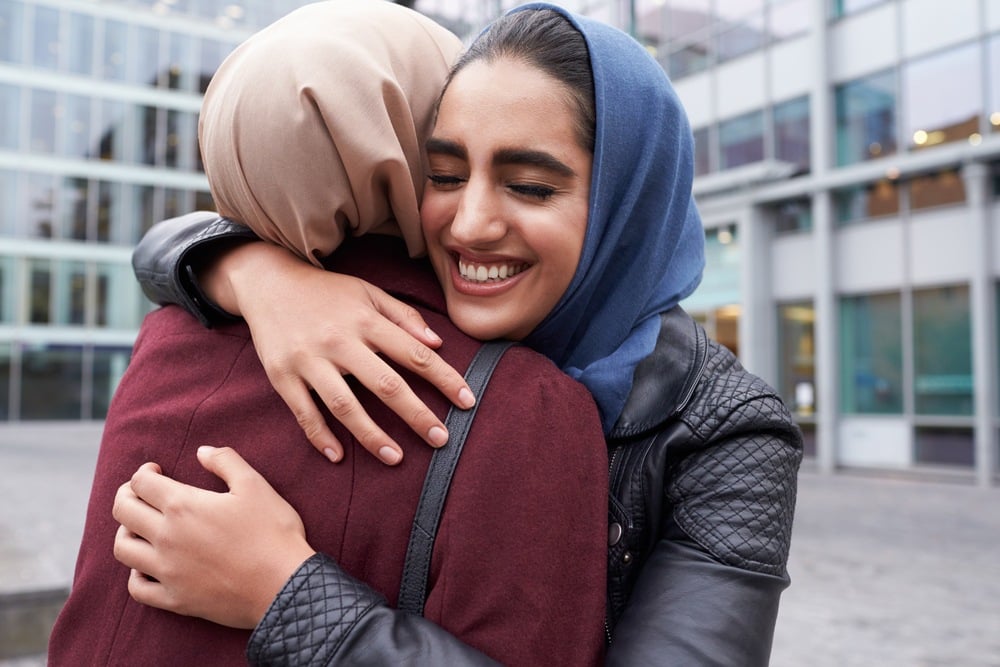Do you identify as a gay Muslim?
Your culture can play a strong role in how you feel about yourself. When you’re gay and muslim, that can lead to some conflicting emotions as well as difficult conversations. For Pride Month, we spoke to the organisation Imaan, who provide information and support for LGBTQIA+ Muslims in the UK.

Coming out as a gay Muslim
Coming out as gay, bi or trans can be difficult at the best of times, but what should you do if you or your family are from a Muslim background? Even if you identify as a gay Muslim, that doesn’t mean others inside or outside the faith will be accepting of that label.
We spoke to Faizan, a trustee for Imaan, the London based charity that supports LGBTQIA+ Muslims, to find out more about supporting young people who feel conflicted by their faith and sexuality. Here’s what they had to say.
We offer a safe space for LGBTQIA+ Muslims
Imaan has been run by volunteers for 20 years. We have monthly social meet ups for LGBTQIA+ Muslims. Ramadan and Eid are also big in our calendar. We provide free Iftar meals (the meal eaten by Muslims after sunset during Ramadan) throughout the month, and offer a safe space for a gay Muslim to participate in Ramadan. We also have an active programme during Pride which is very popular.
There is a conflict surrounding homosexuality in Islam
Most Muslims think homosexuality is against the teachings of Islam. This can cause problems for LGBTQIA+ Muslims who feel caught between their faith, sexuality and gender identity.
Many LGBTQIA+ Muslims are unable to be open about their identities, which can cause social, psychological and familial problems. It can be difficult to reconcile opposing aspects of their identity. This can lead to mental health struggles for people who, for example, identify as lesbian and Muslim.
Oftentimes they can feel isolated and afraid of being rejected by their loved ones simply for being themselves. Some may even feel confused about the sexual attractions and sexual feelings they are having. This is why organisations, such as ours, are crucial in providing the support and care that every single human being deserves, regardless of race, gender or sexual orientation.
There are different ideas on homosexuality in Islam
Views regarding the acceptability of homosexuality in Islam are different depending on who you speak to. When it comes to the question, ‘Can you be gay and Muslim?’, traditional scholars, who do not consider sexuality or gender identity, have one view. This is generally an extremely conservative one and interprets the Quran as being wholly against anything besides heterosexuality.
Other scholars, such as Siraj Kugle, have more liberal views. To get some deeper insight into his thinking, you can read his book Homosexuality in Islam: Critical Reflection on Gay, Lesbian, and Transgender Muslims.
LGBTQIA+ Muslims in the West face opposition
Gay people can be challenged on all aspects of their identity leading to homophobia and biphobia, Unfortunately, being Muslim is no exception. Especially in our current society where reports of Islamophobia are becoming increasingly common . There is a Western narrative that encourages coming out as the only way to be whole or happy as LGBTQIA+. But this isn’t the lived reality of many LGBTQIA+ people around the world. Especially those with more conservative cultural backgrounds, such as Muslims.
Coming out is a journey in itself and doesn’t have to be done according to a specific timeline. Don’t feel pressured simply because of what society says. Your journey is unique and there is no shame in that. To read about one young person’s coming out experience, click here.
We are diverse
Muslim communities come from every part of the world. There are over a billion of us, so it’s impossible to put everyone, or even most Muslims, under one umbrella. Likewise, all families are different, some families discuss personal issues, others don’t. As a good starting point, you should try to identify who, if anyone in your family, you feel able to talk to.
There is more support from straight Muslims than we think
Not all Muslims support pride, but that doesn’t mean we’re all against it. We often see straight Muslims at the Pride March, cheering for us and waving, so I think there’s much more support out there than people who are Muslim and gay typically think.
Finding an inclusive Mosque when it comes to the LGBTQIA+ community is certainly difficult, but the fact they exist is a sign of positive change. Whether it’s Unity Mosque in Toronto or Ibn Rushd-Goethe Mosque in Berlin, Muslim communities aren’t the monolithic entity they’re often made out to be in the media.
If you are Muslim and confused about your sexuality, get in touch
There are groups like Imaan around and available for you to get in touch with. Come to an Imaan meeting, meet others who identify with a range of sexual orientation and gender identities, and gain the support of your community. We’d love to have you. Alternatively, there are tonnes of support groups and charities out there willing to lend a helping hand. Read one of our volunteer’s personal accounts of living as a pansexual muslim.
You might also want to talk about this subject on The Mix’s discussion boards.
Next Steps
- Imaan offer information and support for LGBTQI Muslims in the UK.
- Chat about this subject on our Discussion Boards.
By Nishika Melwani
Updated on 23-Oct-2021
No featured article














